Top 5 Paul Verhoeven Movies
When you think of Paul Verhoeven, what comes to mind? Master of provocation? Master of satire? Master of cult classics? One thing is certain, Verhoeven has always been a divisive filmmaker. When first making his way to make films in American after a string of successes in his native country of the Netherlands, he exploded onto the scene with Sci-Fi classics like Robocop and Total Recall. His films were visceral and primal on every level. Violent, macho, explosive, and objective to women, on the surface the seemed hopelessly tied to the string of guns and girls action movies of the 1980’s. However, his movies operated on a subtextual not often appreciated until you knew a bit more about the filmmaker and tore apart his films. He was labeled a provocateur appreciated by some but criticized by many.
Eventually, in the 1990’s, Verhoeven embraced the provocateur label with movies like Basic Instinct and Showgirls. Even his 1997 Sci-Fi war movie, Starship Troopers–an underappreciated gem–managed to build controversy from critics as pandering to male, science fiction fans, and also from conservatives who understood his sharp spoof on right-wing militarism using fascist imagery. This combined with the tepid reception to Hollow Man, Verhoeven went back to the Netherlands.
However, even though he made a fabulous movie in the mid-2000s that make this list, Verhoeven is making a bit of a comeback of sorts with this year’s Elle. Once again, Verhoeven is taking a leading lady and donning the provocateur badge. The movie is being touted as incredibly thrilling, but also immensely disturbing. And it also puts lead actress Isabelle Huppert in the spotlight and she is already receiving tons of accolades for her performance, as many leading ladies under the direction of Verhoeven have been. It is all very exciting from this fan of Verhoeven, but it begs us to look back at what has come before. So without further ado, let’s get into Verhoeven’s career and explore the best of his filmography.
5) Soldat van Orange (Soldier of Orange)
Before coming to the United States, Verhoeven was an incredibly successful foreign director in his home country of The Netherlands. In the 70’s and 80’s, Verhoeven consistently delivered great stories ranging from romance to thrilling dramas and this 1977 war movie, Soldier of Orange.
Of all his work in the Netherlands, Soldier of Orange is the best of his work and the most accessible to American audiences. Utilizing a time period he would return to often in his war movies, Verhoeven’s war movie is based on an autobiographical novel about a group of friends taking different sides during the Nazi Occupation of the Netherlands during World War II. It stars Rutger Hauer, 5 years before we would forever know him as replicant Roy Batty in Blade Runner, as Erik Lanshof, a student Leiden who joins the Dutch Resistance against Nazi occupation. Hauer was a frequent collaborator with Verhoeven and it shows in his fabulous performance. He is the main character in a group of friends choosing sides in the war and the movie explores the resulting tensions from their relationships and differing opinions on the war.
The movie is not very indicative of his work to come later in the US, and much of what we would expect to see from Verhoeven, his sharp, incisive satirical wit and divisive, provocative moments, is surprisingly absent. However, in this movie, the lacks of Verhoeven-esque elements is a virtue. It sticks to the source material and allows Hauer and his co-stars to command the screen. It is a great and entertaining war film, and it would be a trial run to a fantastic movie that would come much later in his career.
4) Total Recall
This past summer I talked about Verhoeven’s 1990 Sci-Fi action film starring Arnold Schwarzenegger, unfortunately, the only collaboration between the Austrian actor and Dutch director:
“Much like Verhoeven’s 1987 classic Robocop, Verhoeven tackles a dystopian future that presents a future filled with satiric barbs as everything from technological advancement, human ingenuity, advertising, and consumerism. These elements are at work mostly in the background, in TV commercials that play while characters walk through the futuristic world or when dialogue is taking place. Also, his imagination is unlike any other and allows for things like exploding heads, eye-bulging robots, and Kuato. You can never get Kuato out of your head after that scene.
These dressings adorn Verhoven’s more biting commentary on social issues like racism, classism, social hierarchy, exploitation of the poor and working class, and even environmental issues. All of it is played for laughs, but Verhoeven’s satire is often forward-thinking enough to land a hard blow in 2016. A lot of Verhoeven’s filmography has proven to have the same prescient voice as Philip Dick’s Sci-Fi writings. We can only hope companies have the compassion and foresight to avoid our future allowing for minds to be wiped and Kuatos to grow out of our torsos. See you at the party, Richter.”
What I will add to what I previously said is this movie is, like a lot of Verhoeven’s movies, vastly underrated. If you have only seen this movie once or it has been a long time, I encourage you to go back and see it again. His movies have an underlying subtext that makes repeat viewings rich and valuable.
3) Starship Troopers
As previously stated, Starship Troopers may be Paul Verhoeven’s decisive breaking point with American audiences and also his most misunderstood movie. Major critics hated the movie and called said it was too much about appealing to young, MTV-generation and Sci-Fi loving males. It had beautiful women, tons of carnage, super cool space technology, and great special effects. It appeared to be everything this demographic could want, even to the point it influenced one of Blizzard’s greatest RTS games, Starcraft.
However, as I mentioned in a short review of Robocop, Verhoeven’s mastery of satire and irony choices subvert the eventual fandom that crops up around his movies. There are so many different choices in Starship Troopers to focus on, but perhaps the most subversive choice is his use of fascist iconography and imagery. Throughout the movie, there are subtle cues in the dress, symbols, and infomercial/propaganda videos utilizing similar images to those used by Nazi Germany and Italy under Mussolini’s regime. It’s particularly obvious in the formal attire of the infantry and especially the officer’s uniform Denise Richards wears. But, the most obvious and moment of realization comes at the conclusion of the film at Diz’s funeral when Neil Patrick Harris’ character walks out in full officer’s uniform. He’s got the gray and black coat, the gray officer’s hat with black bill and the eagle that looks a lot like the Iron Eagle of Nazi Germany. And then with a big insignia of the military it all hits you at once; we’re the bad guys! Who we have been rooting for the entire film turn out to be the enemy and it is brilliant and cutting. Moments like these define Verhoeven’s filmmaking and heighten my appreciation of his work.
2) Zwartboek (Black Book)
After Verhoeven left the US to return to filmmaking in The Netherlands, he took a six-year break. Now, that doesn’t mean he wasn’t busy, but we did not see another movie from the Dutch master until 2006’s Black Book. As I mentioned before, this movie takes a lot of the ideas and themes explored in Soldier of Orange, but is a more mature and Verhoeven-esque experience. It’s polished, artful, but still true to his fast-paced, quick cut style. It has brutal practical effects when people are shot, is quite graphic, and concentrates little on character development beyond the main protagonist.
Essentially, this is Verhoeven’s take on a “Holocaust movie”. It stars Carice Van Houten, who has rocketed to mega-stardom for her role as Melisandre on HBO’s Game of Thrones, as a Dutch Jew in hiding during the Nazi occupation of the Netherlands during World War II. Once again, Verhoeven’s protagonist is caught in the middle between those resisting Nazi rule and those joining the Nazi regime. The movie is edited to move quickly and embraces an incredibly nihilistic take on the Holocaust and the war, but it is so unbelievably entertaining it is hard to fault it for it’s lack of secondary character development or it’s existential conclusions.
The most striking aspect of the movie is Van Houten’s performance, and it speaks volumes to Verhoeven’s ability to work well with female leads. Like Sharon Stone and Elizabeth Berkely in his two most controversial movies, Basic Instinct and Showgirls, Van Houten commands the screen but is also subject to many scenes of nudity and some incredibly delicate and harsh situations and has resulted in a lot of criticism toward the director. Some of the criticism is justified. However, one thing is for certain, Verhoeven instills a sense of confidence, empowerment, and resilience in his female characters that few directors can muster–see Sharon Stone as a terrifying and alluring femme fatale in Basic Instinct. While Van Houten may consistently be at the mercy of others throughout the movie, she outlasts them all. The final moments bring home her sense of grief but also her strength to endure. It could be argued all day how the inclusion of graphic nudity may be counter-productive in his non-satirical narratives (I tend to agree), but Verhoeven’s commitment to strong, female characters throughout his filmography is to be commended.
1) Robocop
I’ve written about my love of Robocop a couple times in the past on this site. What I have written remains true and sums up my love of this film and Verhoeven’s filmography in general:
If you have any inkling to put any other movie above Paul Verhoeven’s classic Sci-Fi satire—and we’re talking Jonathan Swift level highbrow satire—Robocop says, “Drop it!”
Now if you think I am joking about either the high-level satire or making this movie #1, it’s probably because you either hate this movie or haven’t seen it. Verhoeven is a bit of an acquired taste, but if his sensibilities are pleasing to your movie palette, it goes down oh so wonderfully.
The movie reads like a comic book with its over the top action beats and slightly absurd but super awesome origin story. Verhoeven artfully crafts a masterful balance between the stereotypical action of the late 80’s and 90’s and commentary on everything from American consumerism; skepticism on the advance of technology; fascism and the police state; to corporate greed and gun violence. My favorite element of Verhoeven’s movies are these absurdly strange commercials or adverts he sticks into his movies. They subvert the on-screen narrative and force you to think beyond what you are watching and hearing. It is subtly clever, always hilarious, and are clearly meant to reinforce a narrative you appreciate more on a second viewing.
It’s all there in his first American movie with a tempered provocateur’s eye. Verhoeven’s oeuvre is an acquired taste you can appreciate once you begin to dive deeper into his work. If you can’t get past the nudity and the violence, it can be tough to appreciate him. However, having surveyed his filmography, I can confidently say, “I’d buy THAT for a dollar!”


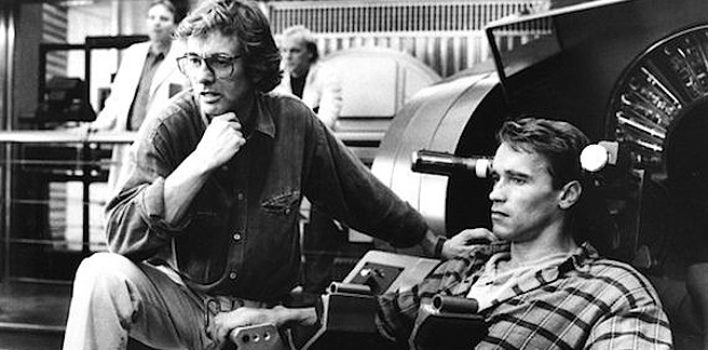
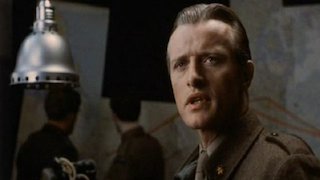
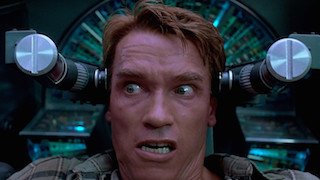
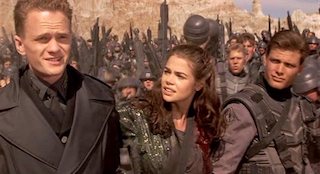
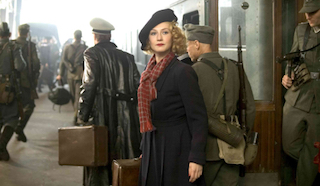
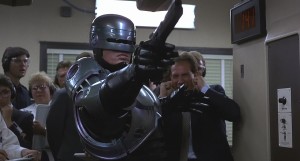

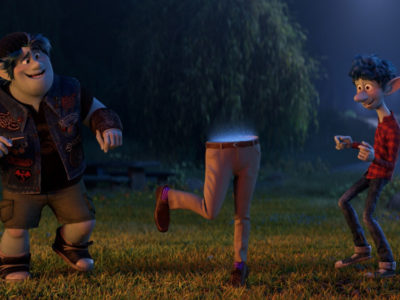



With all due respect, I disagree on the quality of Starship Troopers, particularly it’s subtlety. I know it’s lauded by many as a brilliant satire, but it fails for me, the exception being Clancy Brown and Michael Ironside’s performances, as well as the effects work. IMO, for a satire to be successful, it needs a solid understanding of it’s subject, and Verhoeven didn’t even bother to read the whole novel(only 208 pages). And I think there is a woeful ignorance of what the military is actually like, especially infantry. This is strange to me, since he actually served in his country’s navy. It seems to me Verhoeven took a lot of potshots with his film, and kept missing whatever his target was. And that shower scene? Please….we’re supposed to believe that any of those characters were socially evolved to the extent they could not be awkward or uncomfortable in that situation? I think it’s obviously pervy eye candy, and Verhoeven’s filmography supports that opinion(Showgirls & Hollow Man). I think it’s interesting that so many people laud it as a good satire, while admitting to the poor acting and script. The popularity of this film is a bit confusing to me. My apologies if I’m being too negative. 🙂
Basically everything you feel about this movie, I feel the opposite.
^same